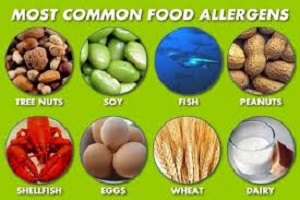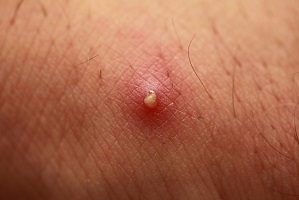Food Allergies: Symptoms, Treatments, & Causes | Allergy in Africa
Food Allergies: Symptoms, Treatments, & Causes | Allergy in Africa

As much as food nourishes, it can also trigger allergies and irritation. According to studies, only a few foods are responsible for 90% of allergy reactions.
The substance in food or drink that creates an allergic reaction or irritation is known as an “allergen,” which is nothing more than a toxic substance that prompts your immune system to respond.
Table of Contents
What are food allergies?
Food allergy is a medical disorder in which the body produces antibodies to a specific food (Immunoglobulin E (IgE)). The immune system’s job is to identify and destroy microorganisms that cause illness, such as bacteria and viruses.
Food Allergies and Intolerances
When the immune system misidentifies a harmless food protein – an allergen – as a threat and assaults it, a food allergy develops. When the body has a chemical reaction to a particular food or drink, it is called food intolerance.
The child may not have a severe reaction to the food at first, but the child may grow sensitized to it, and when the food is eaten (or sometimes only comes into touch with the skin), it activates an immune system response, resulting in the production of histamine and other substances in the body.
Depending on where they are released in the body, they induce a variety of symptoms.
What are the three most prevalent dietary/food intolerances?
Lactose, a sugar found in milk, casein, a protein found in milk, and gluten, a protein found in grains such as wheat, rye, and barley, are the three most prevalent food intolerances.
Quick Facts About Allergies
- An allergic reaction occurs when the immune system overreacts to chemicals that are normally harmless.
- Allergies in children can be overcome.
- Protein allergies account for the majority of food allergies.
- Epinephrine is used as an emergency therapy for allergic reactions, particularly severe ones.
- The best strategy to manage your allergy is to understand and prevent the triggers that produce an allergic reaction.
If you feel you have an allergy, it’s important to figure out what’s causing the reaction.
What are the most common childhood food allergies? Children Food Allergy
Allergies might be to a single food or a group of foods. Multiple food allergies are a type of allergy that is more severe than a single food allergy.
Cow’s milk, dairy products, egg, seafood (fish and shrimp), wheat, soy, and peanuts are some of the most common allergic foods. Cow’s milk is the most frequent food allergy in children.
Food Allergies Treatment
There are two types of medications that can be used to alleviate the symptoms of a food allergy.
- antihistamines – antihistamines are antihistamines that are used to treat mild to moderate allergic reactions.
- Adrenaline (adrenaline) is a drug that is used to treat severe allergic reactions (anaphylaxis)
Is it possible for a child to outgrow food allergies?
Cow’s milk allergy in children usually develops into tolerance as they get older, and typically outgrow their allergy by the age of two to three years. At regular intervals, children are re-evaluated to see if they have developed tolerance. Younger children with milk, soya, and egg allergies are usually checked every six to twelve months, while older children are checked every one to two years.
Although tree nut, fish, and shellfish allergies can last a lifetime, a re-evaluation should be done every two to four years to see whether re-challenges are necessary or if exclusion should be maintained. Can you develop food intolerances later in life?
Many people believe that once they reach maturity, they are immune to new food sensitivities. Unfortunately, research reveals that over half of persons with food allergies develop them later in life. However, many people who think they have food allergies have food sensitivities.
Food Allergies Testing
A skin test. In a doctor’s office, skin prick tests are performed and results are available in 15 to 30 minutes.
- A blood test. The amount of IgE antibodies to the specific food(s) being tested is measured using blood tests, which are less sensitive than skin prick testing.
- Oral Food Challenge
Food Allergy Signs and Symptoms
- Regardless of the allergen, the following are the indications and symptoms of food allergy
- Swelling, itchy skin, warmth, redness, and rashes are all symptoms of the skin system.
- Coughing, wheezing, shortness of breath, chest pain/tightness, throat tightness, hoarse voice, nasal congestion, or hay fever-like symptoms (runny itchy nose, watery eyes, and sneezing), difficulties swallowing are all signs of the respiratory system (breathing).
- Gastrointestinal system (stomach): nausea, pain/cramps, vomiting, diarrhea, and blood in the stools in some youngsters.
- Pale/blue color, weak pulse, passing out, dizzy/lightheadedness, and shock are all symptoms of the cardiovascular system (heart). Other symptoms include anxiety, a sense of “impending doom,” a headache, and a metallic taste in older children.
The most hazardous symptoms of an allergic reaction, also known as anaphylaxis, are:
- Difficulty breathing due to swelling of the airways, which can include a severe asthma attack in patients who already have asthma.
- Dizziness, light-headedness, feeling dizzy or weak or passing out due to a drop in blood pressure. If left untreated, both can result in mortality.
However, it’s vital to remember the signs of a “classic” allergy, which include rashes, asthma, itching, severe gastrointestinal symptoms, and, in rare cases, rapid collapse (anaphylaxis).
Food allergy in Africa: myth or reality?
Allergies are not viewed as significant health disorders in most African countries, particularly Nigeria, because they are thought to be a problem of white people or the wealthy.
However, these ten foods have been linked to the production of allergens that can harm people’s health.
10 most common food allergies include:
- Milk
- Wheat
- Egg
- Soy
- Fruits
- Vegetables
- Tree Nuts
- Peanut
- Sesame Seeds
- Gluten
Food Allergies and Your Immune System
Almost all allergies found in food are proteins. These proteins are not allergens for most people since their immune systems do not react to them.
Different forms of allergy reactions are caused solely by your immune system’s reaction to these proteins. You may be prone to food allergies if your immune system is weak.


